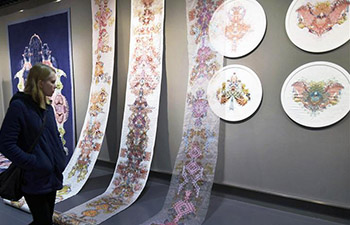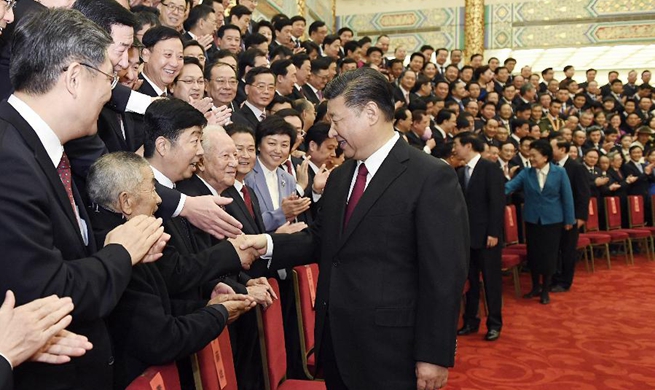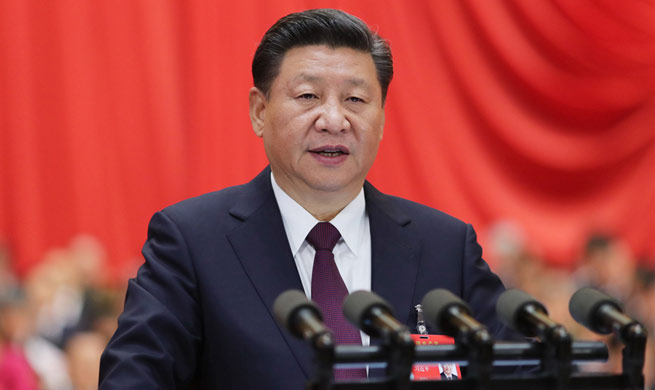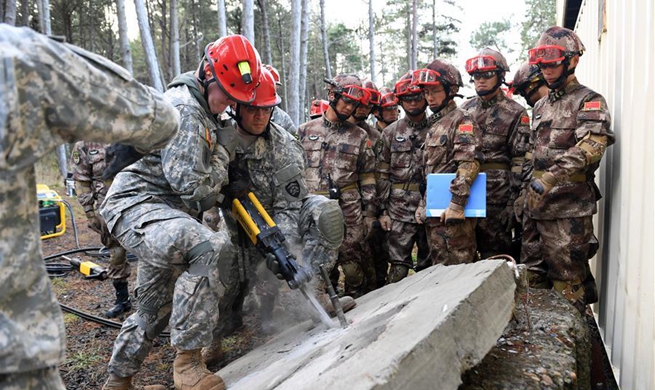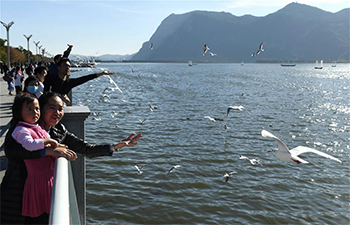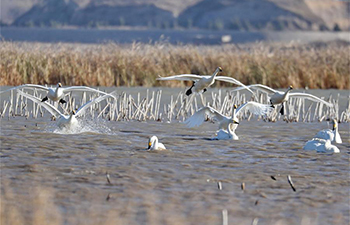RAMALLAH, Nov. 19 (Xinhua) -- The spokesperson for the United Nations Relief and Works Agency for Palestine refugees (UNRWA) Christopher Gunness warned the precarious situation of both UNRWA and Gaza Strip.
UNRWA, which is considered the world's oldest humanitarian organization, remains on the edge of its financial predicament with the growing humanitarian crisis in the region that are overshadowing the growing dependency of Palestinian refugees on the services of UNRWA.
In a special interview with Xinhua, Gunness explained that the root of the problem is not finding a solution for the plight of Palestinian refugees and their descendants until now.
"At the moment we have a 77 million U.S. dollars deficit in our operational budget, which, frankly, is large and unacceptable," he said, glaring his eyes wide open.
The advisory commission is made up of the major donors and the host governments for UNRWA's operations, he added.
The political stalemate and the absence of peace and "the direction and trajectory of the peace process since Oslo has had very direct consequences for UNRWA," he said.
The Gaza Strip is under a tightened blockade both on the Egyptian side and the Israeli side, and the West Bank is seeing a deepening of the occupation, he said. "There is an extreme proliferation of the indignities to which Palestinians are subjected," which increase demand for service and put the bill up for UNRWA.
The story of UNRWA's funding chances does not end here. The ongoing debate is also tackling sensitive issue such as trying prioritizing services.
The series of crises in the Middle Eastern region have overshadowed the needy humanitarian condition in Gaza, which has affected how much the UNRWA donors see the urgency of the situation in Gaza.
Gunness explained that with the tough situation of the population of Gaza, of which 80 percent receives UNRWA services, it is difficult to make the choice of selection or elimination and that "there is a certain problem with the profile of Gaza and the visibility of Gaza, but that hasn't diminished the crisis for the people living there."
"The world may not be paying attention to them, but the situation in Gaza has gotten incrementally worse hour by hour, while that attention has drifted to other parts of the world," he said, warning that "you now have 64 percent unemployment," which is a "record."
The situation in Gaza is further complicated as a result of the blockade and the extreme restrictions on movement of goods and individuals, which is considered a major impediment to the growth of the Palestinian economy and empowerment of the disadvantaged, according to various UN reports.
The official UNRWA spokesperson and various other UN officials have repeatedly cautioned of the ramifications of the continuation of the blockade on Gaza, to which Gunness said that "as a result of the blockade, of manmade policies, we have a situation where the number of people coming to us for food aid has gone up about 11 times."
In recent months, it was made public that 95 percent of the water in Gaza is undrinkable and power outages last for long hours every day, which has lead to a series of setbacks in the health, reconstruction and psychological situation of Gazans, among others.
Gunness said despite this dark situation, he sees a ray of hope for Gaza in the Palestinian national unity government that has recently taken over the executive bodies in the coastal enclave, after rival political parties Hamas and Fatah signed a reconciliation deal in Cairo last October, ending a decade of the control of the Islamic Hamas movement on Gaza.
However, to many Palestinians, the siege and Israeli imposed restriction on the Gaza strip could continue, and that may jeopardize UNRWA's work on the ground, especially in Gaza, where the crisis would only deepen, mostly because the lifting of the blockade is hands of Israel.
Gunness warned that "if the present situation continues, there will be further humanitarian catastrophe for the people of Gaza and, again, we hope it won't happen, but while the blockade continues, there is always a risk of a flare up of violence, which we don't want and nobody needs in Gaza right now."
UNRWA's current strategy is now partly built on widening the donors' base, now urging more governments to meet the growing bill and pitch money in their bowl.
Gunness, who said he was particularly fond of China and its role in the world since he himself worked there as a journalist for a while, explained that an engagement between China and UNRWA is very helpful now.
"Certainly, we in UNRWA, hope that China would engage with us, through government, enterprises or whatever, because I think there is a very productive line of engagement for the Chinese," he said, hoping that "the engagement of China with some of the most disadvantaged communities, peoples and individuals in the Middle East, I think is a real opportunity."
China has been supporting the Palestinians through various means and hopes to revive the old Silk Road into a modern empowering project by launching the large scale Belt and Road Initiative across the world.







